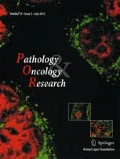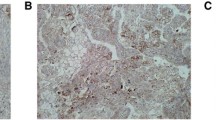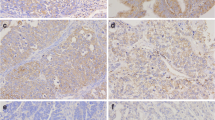Abstract
The aim of this study is to evaluate the clinicopathological significance of L-type amino acid transporter 1 (LAT1) expression in patients with advanced laryngeal squamous cell carcinoma (LSCC). A total of 73 patients with advanced LSCC were retrospectively reviewed. Tumor sections were stained by immunohistochemistry for LAT1, 4F2hc, system ASC amino acid transporter-2 (ASCT2), cell proliferation by Ki-67, microvessel density (MVD) determined by CD34 and p53. A positive LAT1, 4F2hc and ASCT2 expression (staining more than a quarter) in the primary sites were recognized in 85, 80 and 45 %, respectively, and a high LAT1, 4F2hc and ASCT2 expression (staining more than a half) yielded 48, 31 and 18 %, respectively. High expression of LAT1 was significantly associated with lymph node metastasis, 4F2hc, ASCT2, Ki-67 and p53. The expression of LAT1 was significantly correlated with ASCT2, 4F2hc, cell proliferation, and MVD. By univariate analysis, there was no statistically significant relationship between LAT1 expression and prognosis in advanced LSCC. LAT1, 4F2hc and ASCT2 were highly expressed in patients with advanced laryngeal cancer. Our study suggests that the expression of LAT1 plays a crucial role in the metastasis and tumor progression in advanced LSCC.


Similar content being viewed by others
References
Ragin CC, Modugno F, Gollin SM (2007) The epidemiology and risk factors of head and neck cancer: a focus on human papillomavirus. J Dent Res 86:104–114
Thephamongkhol K, Browman G, Hodson I, Oliver T, Zuraw L, members of the Head and Neck Cancer Disease Site Group (2004) Chemotherapy with radiotherapy for nasopharygeal cancer: a clinical practice guidelineevidence-based Series #5-7. Cancer Care Ontario, Program in Evidence-Based Care, Toronto
Christensen HN (1990) Role of amino acid transport and countertransport in nutrition and metabolism. Physiol Rev 70:43–77
Fuchs BC, Bode BP (2006) Amino acid transporters ASCT2 and LAT1 in cancer: partners in crime? Semin Cancer Biol 15:254–266
Kanai Y, Segawa H, Miyamoto K et al (1998) Expression cloning and characterization of a transporter for large neutral amino acids activated by the heavy chain of 4F2 antigen (CD98). J Biol Chem 273:23629–23632
Yanagida O, Kanai Y, Chairoungdua A et al (2001) Human L-type amino acid transporter 1 (LAT 1): characterization of function and expression in tumor cell lines. Biochim Biophys Acta 1514:291–302
Nawashiro H, Otani N, Shinomiya N et al (2006) L-type amino acid transporter 1 as a potential molecular target in human astrocytic tumors. Int J Cancer 119:484–492
Kim CS, Cho SH, Chun HS et al (2008) BCH, an inhibitor of system L amino acid transporters, induces apoptosis in cancer cells. Biol Pharm Bull 31:1096–1100
Kim CS, Moon IS, Park JH et al (2010) Inhibition of L-type amino acid transporter modulates the expression of cell cycle regulatory factors in KB oral cancer cells. Biol Pharm Bull 33:1117–1121
Kekuda R, Prasad PD, Fei YJ et al (1996) Cloning of the sodium-dependent, broad-scope, neutral amino acid transporter Bo from a human placental choriocarcinoma cell line. J Biol Chem 271:18657–18661
Fuch BC, Finger RE, Onan MC et al (2007) ASCT2 silencing regulates mammalian target of rapamycin growth and survival signaling in human hepatoma cells. Am J Physiol Cell Physiol 293:C55–C63
Kobayashi H, Ishii Y, Takayama T (2005) Expression of L-type amino acid transporter 1 (LAT1) in esophageal carcinoma. J Surg Oncol 90:233–238
Kaira K, Oriuchi N, Imai H et al (2008) Prognostic significance of L-type amino acid transporter 1 expression in resectable stage I-III nonsmall cell lung cancer. Br J Cancer 98:742–748
Nakanishi K, Ogata S, Matsuo H et al (2007) Expression of LAT1 predicts risk of progression of transitional cell carcinoma of the upper urinary tract. Virchows Arch 451:681–690
Sakata T, Ferdous G, Tsuruta T et al (2009) L-type amino acid transporter 1 as a novel biomarker for high-grade malignancy in prostate cancer. Pathol Int 59:7–18
Ichinoe M, Mikami T, Yoshida T et al (2011) High expression of L-type amino-acid transporter 1 (LAT1) in gastric carcinomas: comparison with non-cancerous lesions. Pathol Int 61:281–289
Furuya M, Horiguchi J, Nakajima H et al (2012) Correlation of L-type amino acid transporter 1 and CD98 expression with triple negative breast cancer prognosis. Cancer Sci 103:382–389
Kaira K, Oriuchi N, Takahashi T et al (2011) LAT1 expression is closely associated with hypoxic markers and mTOR in resected non-small cell lung cancer. Am J Transl Res 3:468–478
Kaira K, Sunose Y, Arakawa K et al (2012) Prognostic significance of L-type amino acid transporter 1 expression in surgically resected pancreatic cancer. Br J Cancer 107:632–638
Shimizu K, Kaira K, Tomizawa Y et al (2014) ASC amino acid transporter 2 (ASCT2) as a novel prognostic marker in non-small cell lung cancer. Br J Cancer 110:2030–2039
Toyoda M, Kaira K, Ohshima Y et al (2014) Prognostic significance of amino acid transporter expression (LAT1, ASCT2 and xCT) in surgically resected tongue cancer. Br J Cancer 110:2506–2513
Li R, Younes M, Frolov A et al (2003) Expression of neutral amino acid transporter ASCT2 in human prostate. Anticancer Res 23:3413–3418
Whitte D, Ali N, Carlson N et al (2002) Overexpression of the neutral amino acid transporter ASCT2 in human colorectal adenocarcinoma. Anticancer Res 22:2555–2557
Kaira K, Oriuchi N, Imai H et al (2009) CD98 expression is associated with poor prognosis in resected non-small-cell lung cancer with lymph node metastases. Ann Surg Oncol 16:3473–3481
Kaira K, Oriuchi N, Imai H et al (2009) Prognostic significance of L-type amino acid transporter 1 (LAT1) and 4F2 heavy chain (CD98) expression in stage I pulmonary adenocarcinoma. Lung Cancer 66:120–126
Namikawa M, Kakizaki S, Kaira K, et al (2014) Expression of amino acid transporters (LAT1, ASCT2 and xCT) as clinical significance in hepatocellular carcinoma. Hepatol Res in press
Hassanein M, Hoeksema MD, Shiota M et al (2013) SLC1A5 mediates glutamine transport required for lung cancer cell growth and survival. Clin Cancer Res 19:560–570
Imai H, Kaira K, Oriuchi N et al (2010) Inhibition of L-type amino acid transporter 1 has antitumor activity in non-small cell lung cancer. Anticancer Res 30:4819–4828
Acknowledgments
This work was supported in part by Grant 23591750 (K. K) and Grant 23592523 (K. C) from the Ministry of Education, Culture, Sports, Science and Technology, Japan, and National Hospital Organization Policy Based Medical Services. We thank Ms. Chizuko Tomioka for their technical assistance of immunohistochemical analysis.
Conflicts of Interest
We, all authors, have no financial or personal relationships with other people or organizations that could inappropriately influence our work.
Author information
Authors and Affiliations
Corresponding author
Rights and permissions
About this article
Cite this article
Nikkuni, O., Kaira, K., Toyoda, M. et al. Expression of Amino Acid Transporters (LAT1 and ASCT2) in Patients with Stage III/IV Laryngeal Squamous Cell Carcinoma. Pathol. Oncol. Res. 21, 1175–1181 (2015). https://doi.org/10.1007/s12253-015-9954-3
Received:
Accepted:
Published:
Issue Date:
DOI: https://doi.org/10.1007/s12253-015-9954-3




